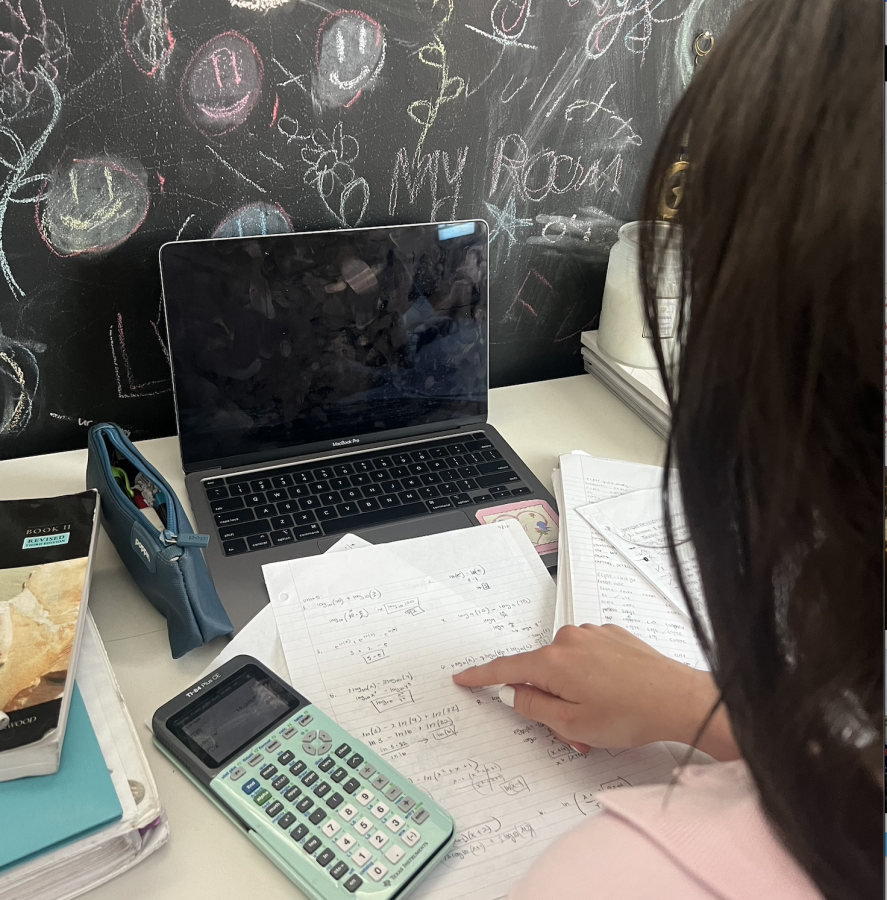The Final Stretch: Tips and Tricks for Success During Cumulatives
Managing your stress and time while studying is crucial especially while studying during cumulatives week.
It’s that time of the semester again: Cumulatives Week. Teachers are assigning you final projects or tests, Mr. Ogden is sending out reminder emails, and stress seems to be seeping out of every corner of the School. This week will be a long one, but you can make it easier by managing your stress levels and time efficiently while studying. So, here are some reminders on how to manage your stress, and time during this excruciating week.
1. Get as much sleep as possible.
There’s a good reason why everyone tells you to prioritize sleep: it works! Mrs. Megan Broderick, Director of Counseling (‘98), noted that “sleep is a hugely protective factor not just for studying but for stress and anxiety.” In times like cumulatives, our stress and anxiety levels are at an all time high, and sleep can help manage them.
In fact, a study published in the National Library of Medicine where 16 adults had their sleep restricted to an average of 4.98 hours a night for one week illustrated how drastically less sleep can affect one’s mood and stress levels. The participants were significantly more tense, fatigued, and confused, and had an increased level of stress and overall mental exhaustion. Once they returned to their normal sleeping hours, these effects were reversed.
Sleep also helps with memory and processing information. Mrs. Jane Mattox, Academic Support Coordinator, explained how during sleeping time your brain is organizing information and that those who get a full eight hours of sleep are in a better position to take a test than those who may have studied all night and only gotten two hours of sleep.
Dr. Matthew Walker, a sleep scientist at the University of California, Berkeley, explained this idea to the National Library of Health News, and noted that during the non-rapid eye movement (REM) periods of sleep such as light sleep and deep sleep, your brain is preparing itself for accumulating information. Dr. Walker cited that a lack of sleep could hinder your ability to learn and process new ideas by 40 percent.
The takeaway: Sleep is good for you. It is necessary, and during this stressful week it can relieve and revive you. Of course, it is difficult to achieve a full eight hours of sleep or more, but at least aiming for that could improve your stress levels, learning ability, mood, and test taking. As Mrs. Broderick said, “the faster we can learn that [a lack of sleep] is not good for you the better.”
2. Schedule study sessions.
Organizing your time will allow you to use it more effectively, and leave you feeling more prepared. But you must schedule your time in a manageable way. As Mrs. Broderick said, “sitting down and saying, ‘ok I am going at this for five hours straight,’” is unreasonable and that inevitably “you’re going to get distracted.”
You really need to find what works for you. Mrs. Mattox emphasized that starting small, especially when you are feeling unmotivated to study or work on a project, is the best way to go. She explained that, for example, if you do not want to work on your research paper, try working on it for 15 minutes and set a timer. If at the end of those 15 minutes you still do not feel like working on the paper, move on to the next task. But, Mrs. Mattox noted that, “usually what happens is once you get going, it ends up being not as horrible as you built it up in your imagination to be, and then you have some momentum to keep going.”
Mrs. Mattox also recommended using a timer to ensure that your studying is truly studying. She explained that if you want to study a math cumulative for 30 minutes, set a timer for 15 minutes instead as a sort of check-in point. She said that after 15 minutes if you are effectively studying then finish the last 15 minutes. However, if you are spacing out or distracted, attempt to study for the last 15 minutes, and definitely “don’t beat yourself up over it.”
3. Take breaks.
Breaks while studying are a must. Like sleep, study breaks can help refresh not only your brain but your body. Cornell Health reported that purposeful breaks can “refresh your brain and body, increase your energy, productivity, and ability to focus.”
For these breaks to be effective for your studying, you need to be selective with how much time you spend taking a break as well as what you are doing. Mrs. Mattox recommended setting a timer for breaks, as “five minutes can quickly turn into five hours.” This method also allows you to give yourself permission to take a break.
Mrs. Broderick added that studying history for an hour and then taking your dog on a walk and going on your phone for 30 minutes would be a reasonable break, as you are “giving yourself permission and you won’t be feeling any guilt” about taking a study break. She understood that when “you take downtime and then you feel really guilty,” but when you are “deliberate and mindful of what the downtime includes,” that can help remove that sense of guilt.
Realistically, breaks often include your phone — quickly checking Instagram or maybe watching a few videos on TikTok to decompress — but it is important to also physically and emotionally revive yourself during a break. Mrs. Mattox gave a few examples of effective breaks, including moving around, drinking water, playing with a pet, or deep breathing.
Mrs. Broderick also emphasized the importance of exercise during a break. Her examples of a break included exercise, connecting with people who live in your house or friends, or having a healthy snack. That way, “when you go to study you will be doing more focused work instead of daydreaming,” Mrs. Broderick added.
4. Talk to people.
Cumulative week is a stressful time for everyone, and oftentimes someone else is likely feeling the same way as you may be feeling.
Mrs. Broderick highlighted that “talking about it when you feel really overwhelmed instead of suffering in silence is really helpful.” She added that talking to a trusted family member, teacher, or her and Ms. Gray allows “you get [the stress] out of your body.” This allows others to shoulder the burden with you, instead of battling it on your own. Of course, that person “can’t take [the stress] away or move your test, but having a shared burden can be really helpful,” Mrs. Broderick finished.
So, try to manage your time in a reasonable and effective way the best you can, and don’t forget that many others feel the same way. It is going to be hard, but it is the last week of school and we got this Knights!

Bella Gallus is a senior and the Managing Editor for The Tower. Bella relies on her Spotify playlists, carefully curated for each of her moods, and her...







